How Adelaide University alumnus Anna Butterss joined forces with a country superstar
From humble beginnings studying jazz at the University of Adelaide, Anna Butterss is now rocking out with a Grammy award-winning act. This is their incredible story.
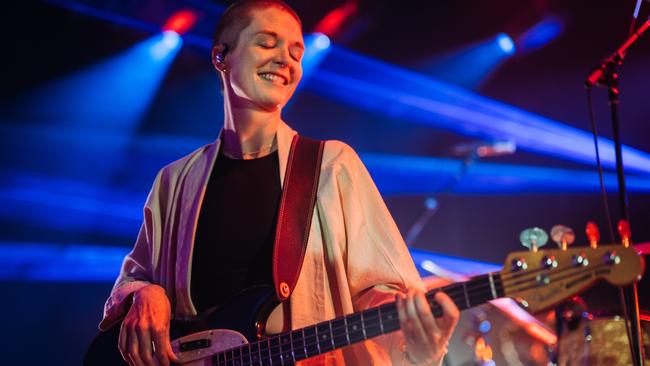
SA Weekend
Don't miss out on the headlines from SA Weekend. Followed categories will be added to My News.
Jason Isbell has traditionally opened his live shows by introducing himself and his band, the tight-as-a-fist 400 Unit, as hailing from “Muscle Shoals, Alabama … for the most part”.
Tonight, however, things are a little different.
Isbell – the multi Grammy award winner whom the LA Times recently referred to as “one of the great working lyricists and consummate touring acts”, and who is widely regarded as one of the leading exponents of the increasingly massive but genre defying Americana/alt country/rock/roots/insert-your-own-term-here movement – eschews the standard greeting, says a quick, warm hello and then launches into an old favourite, 24 Frames.
The gig, in late 2023, is at Nashville’s legendary Ryman Auditorium and is being live streamed around the world.
Noticeably absent is Isbell’s close mate and collaborator Jimbo Hart, who has taken leave from the band for health reasons (it will be announced a short time later that he has left for good).
In his place stands a new, rather distinctive looking bass player with short hair, black overalls, and what appears to be Doc Martens, locking in seamlessly with long-time drummer Chad Gamble as they lay a solid canvas for Isbell and his lead guitarist Sadler Vaden to play their Crazy Horse-inspired, intertwined guitar improvisations.
The Reddit forums begin clicking over: Where’s Jimbo? And who the hell is the new player? While Reddit forums are admittedly not the most reliable nor forgiving of measures, the consensus seems to be: Whoever they are, they are pretty damn good (or darn if you are reading this in the US).
After sublime stand-up bass lines delivered throughout Cast Iron Skillet, Isbell’s heartbreaking ode to the contradictions of his hometown, the man himself puts an end to the mystery.
“Over here to my right, from Adelaide, South Australia, is Anna Butterss on the bass guitar.”
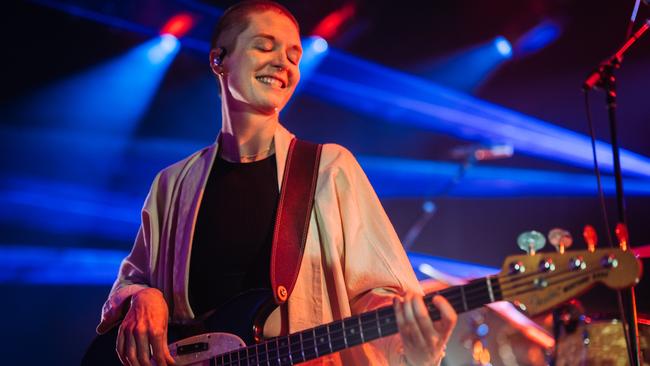
Smiling down a Zoom call from home base in Los Angeles, Anna Butterss laughs when it’s suggested this all must seem a long, long way from Adelaide.
And an even a longer way from Marryatville High, where Butterss gained a strong musical grounding; the University of Adelaide, where intense jazz studies culminated in graduation from the Elder Conservatorium in 2012 and a scholarship to the University of Indiana, which spawned a masters degree; and from the foyer of the Hilton Adelaide, where the first real live gigs occurred.
But a strong Aussie accent and self-effacing demeanour means that after a few minutes, it feels like we’re in the front bar of the Austral and discussing Butterss’ visit to Adelaide last year to see mum and dad Jane and Phil at their Parkside home, sister Matilda and her family, and some old friends.
“I love Adelaide and there are times it’s bittersweet for sure (being away),” Butterss says.
“It’s hard to be so far away from my family and I still have good friends there. The last time I was back we played a show at ‘The Con’ which was really nice, with people I went to uni with, so, yeah … I always have a good time. It’s just such a beautiful city.”
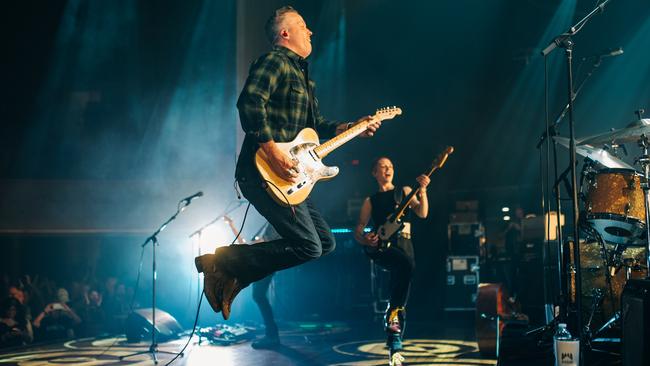
Butterss, who uses they/them pronouns, has been living as an in-demand working musician in LA since 2014, having played with a conga line of high profile names including Phoebe Bridgers, Jenny Lewis, Madison Cunningham, Bright Eyes and Aimee Mann (the stint with Lewis included an opening spot for Harry Styles, highlighted by a full house at Madison Square Gardens), and as recently as 2022 released a solo, instrumental jazz record, Activities.
By any estimation, however, the Isbell gig is next level. Initially hired for six shows, the 400 Unit clearly liked what they saw (and heard), and Butterss is now an entrenched member for 2024, meaning a full year of back-to-back touring.
“I almost didn’t consider it because I had so much going on,” they say a little sheepishly of the initial approach, via a friend, mid last year.
“They were looking for a sub last minute and I think my number and name got passed around.”
The initial offer was about a week’s worth of shows … which, much to Butterss’ alarm, was set to kick off about a week later.
“I was in between a couple of other tours and while I was familiar with Isbell, I wasn’t super familiar with his music. In the end, I thought, ‘Well, let me just see if it works out. And if it doesn’t, then at least I made the connection’. So I just had a week and I learned 30 songs.”
The first gig was the record release for Weathervanes, the album Isbell wrote from his trailer while acting in Martin Scorsese’s Killers of the Flower Moon, which has since been nominated for three Grammy Awards, listed as one of Rolling Stone’s albums of 2023 and peaked at No.12 on the US Billboard charts (No.1 for Indie music).
“It was a little nerve-racking. It was quite a small venue called Eastside Bowl in Nashville, which is a bowling alley,” Butterss says.
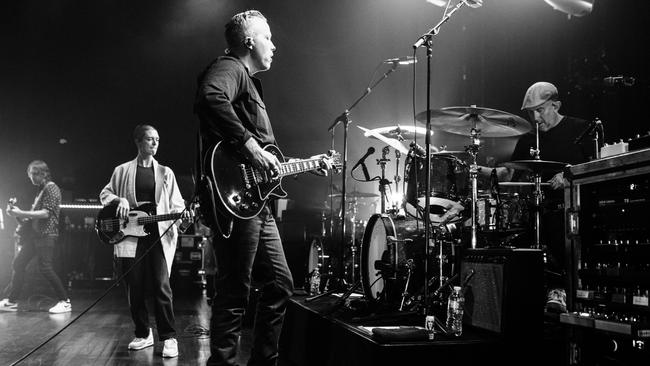
“It was maybe like a 800 cap (capacity) or something, which is much smaller than he usually plays.”
It was the first time the band had played the new material but, with the new bass player in tow, something just clicked.
“I played about six shows with them and it went really well and came back to LA and they called me the next day and said, ‘Can you come back tomorrow?’
“I just got back on a plane and went out and I’ve spent pretty much the last six months with them. And then I’m gonna stay on with them.”
This has included a series of high profile TV appearances, everything from Colbert, to Jimmy Kimmel to Austin City Limits (Butterss was happy to be skipping the Grammys which were held last Sunday, a few weeks after we chatted. Jason Isbell and the 400 Unit would end up winning Best Americana Album for Weathervanes and Best American Roots Song for Cast Iron Skillet).
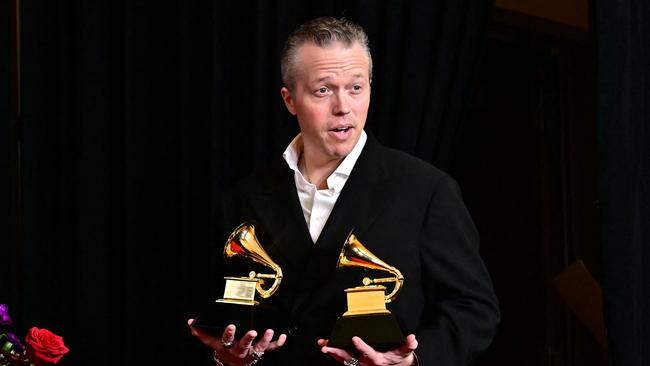
For the months ahead there’s a packed schedule, including a run of stadium gigs with emerging country superstar Zach Bryan, who recently sold out a one-off show in Melbourne at Flemington Racecourse in 20 minutes, as well as stints at Radio City Music Hall in New York (which is already sold out) and the legendary Red Rocks Amphitheatre in Colorado.
Butterss admits it’s all been something of a blur and tries not to overthink what entering the next level of the stratosphere might mean for the longer term. Ultimately, at this point in time, everything just feels right … and fun.
“I’ve been freelancing for so long and I’ve been kind of jumping between different artists so I wasn’t really thinking about it much at the time in terms of longevity,” they say.
“I didn’t know anyone in that crew. Usually when I come in, I’ve met someone or I have a mutual friend or something, but with this I was really coming in meeting everyone for the first time.
“And honestly, like every single person, everyone in the band, the crew, Jason, the management are so welcoming and so lovely.
“It was just people that I wanted to be around; I mean I played five shows with them and they threw me a going away party. I’d known them for a week. Who does that?
“It’s really a band. It’s not just like an artist and whoever the side people are, it’s really a unit, as the name suggests. So I don’t know, I’m just having a really good time.”
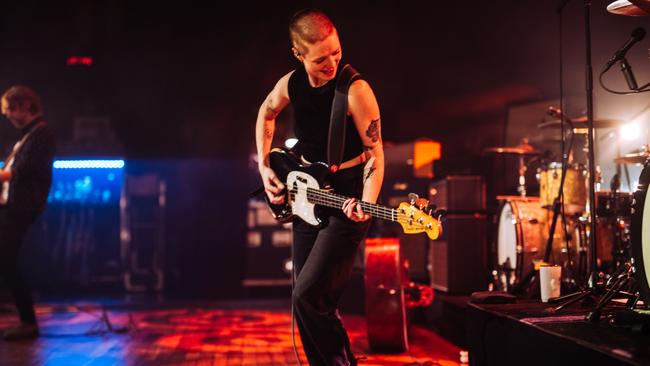
Listening to Butterss’ solo debut, an eclectic and immersive mix of instrumental jazz, with what one can only assume are highly complex bass lines, it’s clear the fairly straight ahead approach of the 400 Unit hasn’t presented a major technical challenge.
Butterss says, however, such assumptions miss the point.
“I don’t even really consider it like that,” they say.
“You’re playing this music that really means a lot to people, so you need to come in and try and understand that meaning and the importance and the emotion behind it. And then you need to convey that.”
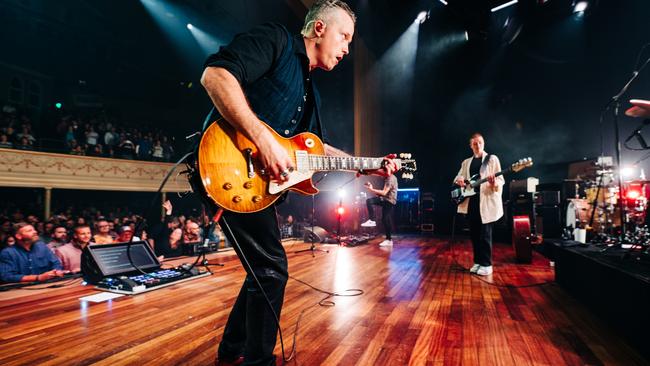
Butterss hadn’t really set out to be a bassplayer, but growing up in a musical family certainly helped.
“My parents were really into music. They played Irish music. They played in groups for a number of years and they’re into all kinds of music, classical music as well,” Butterss says.
“They were very into singing, like singing in the car, so from a young age, I found it really interesting.”
Enrolled at Marryatville High School’s much lauded music program, the flute was their first instrument of choice.
“That was a really transformative moment,” Butterss says.
“The first week of class they said that everyone else plays two instruments and you only play one. And you can’t just play the flute because everyone plays the flute and you’re never going to get in the orchestra. So you need to choose another instrument.
“At the time I wanted something different and I hadn’t listened to much jazz, but I saw that the other kids there were listening to it and playing and it seemed really interesting.
“So I picked upright bass because I wanted to get into that. And from the second I touched it, I was like ‘This is it’.” (As an aside the flute does make a reappearance on the opening track of Activities).
Butterss is unsure whether, deep inside, there was a natural affinity for the bass, but what did come very easily was a love of practice.
“I find practice, the act of practising, really engaging and I found that from a young age. I never want to just play something through, I always want to get to the basics and take everything apart,” they say.
“So I was like 15 years old and had the metronome on at 60 and was just playing the same note over and over again for an hour to try and get a consistent sound.”
Improvisations, the heart and soul of jazz, proved a little tougher.
“I think it took me about 10 weeks in the improvisation class before I actually played a note,” they say.
After that first note, however, the floodgates opened, spurred on by an encouraging group of like-minded musicians and teachers.
“I think the first time I played it was in the lobby of the Hilton Hotel. Then I started playing jazz gigs around Adelaide when I was about 16.”
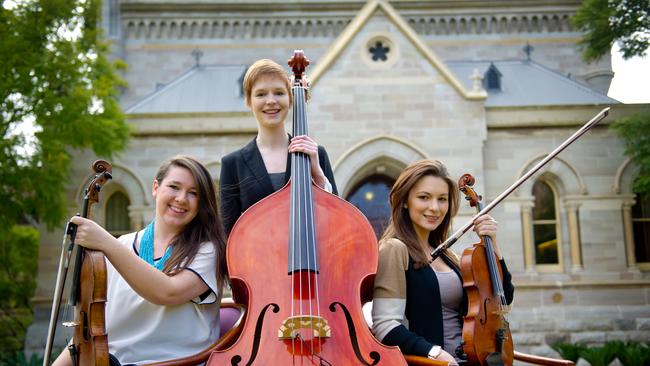
From there to uni, then an exchange to Indiana University, and then a scholarship which allowed Butterss to realise a long-held dream to stay in the US, without going into massive debt.
That’s not to say they didn’t love growing up in Adelaide and Butterss speaks warmly again of a hometown that was uncomplicated, with a strong sense of community, particularly for a budding muso.
“Coming up in Adelaide, I felt very much part of the music community there and I thought there’s a really cool creative scene,” they say.
“I had a lot of friends who would play a lot and I definitely felt like I belonged. But I think I also felt a little trapped, only because Adelaide is so geographically isolated. I wanted to live in a big city and I wanted to see the world.”
So, like a generation or two of young South Australians before them, they took off to see the world, knowing that, for an aspiring jazz musician, the US was the place to be.
“Even though Indiana isn’t exactly the birthplace of jazz, to get to a culture where that music is much more ubiquitous and ingrained just kind of changed things for me,” they say.
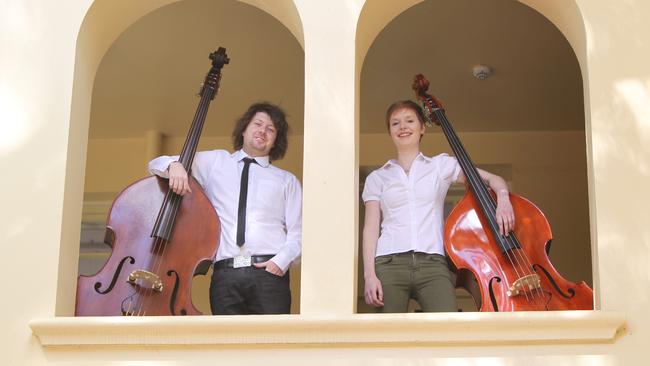
Los Angeles became home in 2014 when Butterss moved there with their partner, also a musician.
There they both found yet another community of like-minded, passionate musos.
At that point though, Butterss was yet to pick up an electric bass and most of the gigs were restricted to smaller venues or restaurants.
“The first five years I was in LA, I was only interested in jazz. I don’t think I played electric bass at all. I thought it was going to be like jazz and then academia, which is a path that a lot of jazz musicians go into and I had a master’s degree so that was a feasible option.”
Then something changed, big time.
“I saw people around me touring and playing in bands and playing other kinds of music and that really, really caught my attention,” they say.
“I had close friends here who were playing jazz and really creative, improvised music, but then also playing with these bands, and then I realised all these bands are actually really cool.
“I just decided to focus on it. I decided I wanted to tour and I wanted to play on records.”
The first tour was with indie-folk singer-songwriter Phoebe Bridgers.
“They found me through an improvised music gig that someone saw me play and that was when I was first like, ‘Okay, I guess like I’m playing electric bass every night’. I had to sing for the first time too. It was a really big learning curve.”
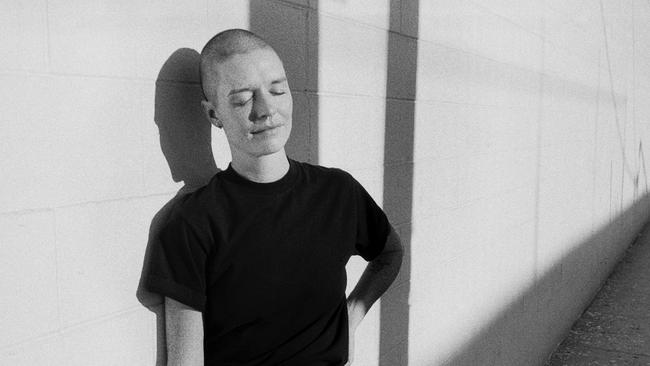
Now Butterss is embarking on what will be the biggest tour of their career with an act at the top of its game (GQ recently described Isbell as “among the greatest singer-songwriters of his generation”.)
Whether it’s a side effect of Taylor Swift mania or artists like Zach Bryan building an audience off TikTok or a reaction against overly produced, auto-tuned pop, the mass appeal in 2024 of authentic singer-songwriters with something to say recalls the Woodstock generation.
Anyone who attended the Bryan concert in Melbourne would be hard pressed to dismiss it as a passing fad.
Isbell’s progressive politics and at times outspokenness on social platforms have, deliberately or not, kept his audience to a manageable level, but it’s undeniable he and the 400 Unit are riding an ever growing wave.
It seems that right now, Butterss is simply looking forward to enjoying the ride, however big it gets and however long it lasts.
They would “love” to record with Isbell, while continuing side and solo projects, but at this point the main focus is the tour, and not thinking too much about the considerable difference between the foyer of the Hilton and, say, the 65,000 capacity at Ford Field Detroit.
Ultimately, Butterss is loving the band, the environment, and the music, referring to it on more than one occasion as just “super fun”.
So what is it that makes it special?
“Oh, man, I mean so much stuff. It’s just really genuine. You know? It’s just everyone playing it. Jason feels it really deeply,” they say.
“I mean, his lyrics are incredible. The songs are constructed so that there’s nothing unnecessary in that music. Everything is supposed to be there, every guitar part, everything is in its place.
“It’s all very focused on the emotion and the feeling of that song. It’s very genuine.
“And then with the more rock ’n’ roll ones, they’re really fun to play. Even though they’ve all been playing together for 10 to 15 years, the energy is still great. They’re all really into it.
“Everyone’s really giving it everything every night, which is definitely not always the case on tours that I’ve been on, you know where people are phoning it in, or people are checking out, and (here) it just really feels that we’re all making something together.
“We’re all really kind of ‘in it’. I think it’s really special. And I think the audience feels that as well.”




